| |
|
2012
Edition
|
| |
Hymn |
Tune,
composer, year |
Author
or translator, year |
Comments |
| 1 |
Coming
out of nowhere . . . the Welsh triumph!
Guide me, O Thou Great Jehovah
(or Redeemer)
|
Cwm
Rhondda, John Hughes, 1905, but a surprising
number of other tunes. We suspect its Rhondda that
pushes Guide to the top of the charts, though. |
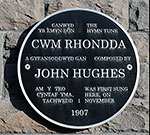 William
Williams, called the "[Isaac] Watts of Wales" (1717-1791).
He lapsed from the CofE to become a Calvinist Methodist.
He wrote several texts, one of which begins unpromisingly:
'The enormous load of human guilt'. Guide Me's actual first
line is Arglwydd, arwain trwy’r anialwch. William
Williams, called the "[Isaac] Watts of Wales" (1717-1791).
He lapsed from the CofE to become a Calvinist Methodist.
He wrote several texts, one of which begins unpromisingly:
'The enormous load of human guilt'. Guide Me's actual first
line is Arglwydd, arwain trwy’r anialwch.
|
Guide
Me is published in — wait
for it — 1507 hymnals. That's one thousand,
five hundred, and seven hymnals. Who knew there
were that many?
In
the BBC's One
Foot in the Grave episode 'The
Beast in the Cage', this song was sung
by disgruntled car mechanics to show their contempt
for Victor Meldrew's automobile'.
|
| 2
tie |
Number
3 in 2003; moved up a place.
'Be thou my vision'
|
Slane, Irish
folk melody. 'SLANE
is an old Irish folk tune associated with the ballad
'With My Love Come on the Road" in Patrick W. Joyce's Old
Irish Folk Music and Songs (1909). It became a hymn tune
when it was arranged by David Evans (PHH 285) and set to
the Irish hymn "Be Thou My Vision" published in
the Church Hymnary (1927)'.
|
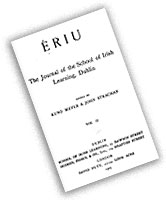 Translated
into English by Mary E. Byrne, in “Eriú,” Journal
of the School of Irish Learning, 1905, and put into
rhyme by Eleanor H. Hull, 1912. Translated
into English by Mary E. Byrne, in “Eriú,” Journal
of the School of Irish Learning, 1905, and put into
rhyme by Eleanor H. Hull, 1912.
The Journal of the School of Irish Learning isn't
where one would have expected to find the text of what is
one of the most popular hymns in the Anglican world.
|
Another
ancient Irish favourite. For a while it looked as if it would
be Number One in our list. It lost out to a sturdy Welsh
hymn. |
| 2
tie |
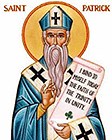 Pat's
back! Pat's
back!
'I
bind unto myself today' |
St
Patrick's Breastplate, Charles Villiers Stanford,
1902 |
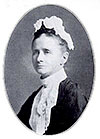 Translated
in 1889 by the prolific and gifted Mrs C F Alexander, from
a very early Gaelic poem. Translated
in 1889 by the prolific and gifted Mrs C F Alexander, from
a very early Gaelic poem. |
 Just
in case you ever thought about a St Patrick's breastplate
t-shirt, you can now purchase one. Just
in case you ever thought about a St Patrick's breastplate
t-shirt, you can now purchase one.
We prefer to sing it rather than to wear it.
|
| 3 |
Number
17 in 2003; rockets up the chart. Is it a wedding effect?
'Love divine, all loves excelling' |
Sometimes
set to Beecher, Airedale, Blaenwern (most common in
the UK), Love Divine (Stainer), and Hyfrydol. Famously
sung at the 2011 wedding of Prince William and Catherine
Middleton to Blaewern.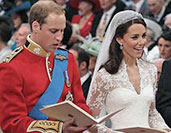
|
Charles
Wesley, 1747. |
 Another
Wesley super hit. Is there any Anglican who doesn't like
this hymn? Another
Wesley super hit. Is there any Anglican who doesn't like
this hymn?
And how many dogs are named for a hymn tune?
Meet Hyvvie (Hyfrydol, if one is being formal.) His image
was kindly sent to us by a reader.
|
4 |
It
hasn't come down; it's stayed at just the place where
it was in 2003.
'Come down, O Love Divine'
|
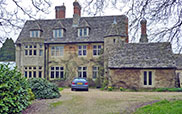 Down
Ampney, Ralph Vaughan Williams, 1906. (Down Ampney
vicarage, right, where RVW was born.) Down
Ampney, Ralph Vaughan Williams, 1906. (Down Ampney
vicarage, right, where RVW was born.)
|
Mid-14th
century Spanish poem by Bianco da Siena; English translation
by Richard Littledale in 1867. |
This Ralph
Vaughan Williams tune is a cross-Communion favourite.
If there were one hymn that the Anglican Communion could
agree on — and covenant to sing — it might be this. |
| 5 |
A
perennial no-name favourite
'For all the saints who from their labours rest'
|
Sine
Nomine, Ralph Vaughan Williams, 1906. 'The
tune's title means "without name" and follows the
Renaissance tradition of naming certain compositions "Sine
Nomine" if they were not settings for preexisting
tunes'. |
William
W. How, in Hymns for Saint’s Days, and Other Hymns, wrote
this in 1864. |
A
popular text married to a brilliant tune. One of the few
hymn texts written by an Anglican bishop, the much-loved
Bishop of Wakefield. |
| 6 |
A
surge of popularity for a hymn not to be seen in 2003.
'King of Glory, King of Peace'
|
General
Seminary (Episcopal Church in the US), Gwalchmai, Jesu,
Meines Herzens Freud. See image of General Seminary
(New York, New York) to the far right. |
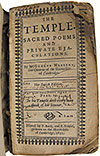 The
blessed George Herbert, with the text in his work 'The Temple'. The
blessed George Herbert, with the text in his work 'The Temple'.
The hymn text's first appearance was in 1697, in a something
called 'Select Hymns Taken out of Mr. Herbert's Temple & turned
into the Common Metre To Be Sung In The Tunes Ordinarily us'd
in Churches'.
|
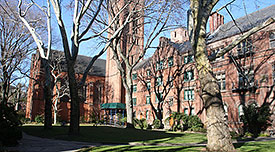 |
| 7 |
The
song is now better known: From No. 18 in 2003 to No.
7 now.
'My song is love unknown'
|
 Love
Unknown, John Ireland, 1919. Love
Unknown, John Ireland, 1919. |
Samuel
Crossman, from The Young Man’s Meditation, or Some
Few Sacred Poems upon Select Subjects, and Scriptures, 1664.
|
The
Revd Mr Crossman is 'Buried in the South Aisle of the Cathedral
Church in Bristol" [of which he had been appointed Dean
a few weeks before]'. And ill-timed preferment indeed! |
| 8 |
Well,
not only is the day ended, but also the empire alluded
to in the words.
'The day Thou gavest, Lord, is ended'
|
St
Clement, 'composed for this text by Reverend Clement
C. Scholefield [and] published in Arthur S. Sullivan's
1874 hymnal, Church Hymns with Tunes; of his own
accord Sullivan (PHH 46) "canonized" his curate,
Scholefield, by naming this tune ST. CLEMENT'.
There are alternate tunes, but really, why bother? |
 John
Ellerton (1826-1893) wrote this text as a part of 'A Liturgy
for Missionary Meetings' in 1870. One might well call that
year a high point of the British Empire. John
Ellerton (1826-1893) wrote this text as a part of 'A Liturgy
for Missionary Meetings' in 1870. One might well call that
year a high point of the British Empire.
Just think of all those world maps with a good portion of the
lands coloured pale pink (which was, for whatever reason, chosen
to represent the Empire).
|
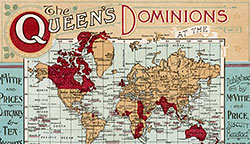 We
don't know why the pink is red in this case. But the point
is still the same. We
don't know why the pink is red in this case. But the point
is still the same. |
| 9 |
Nowhere
in 2003 and here it is tied at No. 9.
'He would valiant be 'gainst all disaster'
|
St Dunstan's and Monk's
Gate contest for the most common tune; St D's seems
to edge out the Gate.
|
John
Bunyan! Mr
Valiant-for-Truth!
|
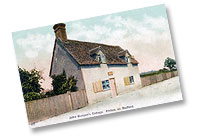 <-
John Bunyan lived here. <-
John Bunyan lived here. |
| 9 |
Tied
at No. 9 is the last chorus of Beethoven's Ninth Symphony.
Seems right somehow.
'Joyful, joyful, we adore thee'
|
Hymn
to Joy, L. van Beethoven, from the Ninth Symphony, adapted
by Edward Hodges, 1824.
Apparently
there is some other tune to which the text is set. We've
no idea what it is. And we'd guess that the other tune wouldn't
have ever propelled this into top hymn roster. |
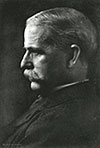 Henry
J. van Dyke wrote this hymn while a guest at Williams College,
Massachusetts, USA in 1907. We don't know what inspired him. Henry
J. van Dyke wrote this hymn while a guest at Williams College,
Massachusetts, USA in 1907. We don't know what inspired him.
But he did intend the text to be used with Beethoven's melody. |
Another
example of a regional favourite; it appears in US, Canada,
and Australian hymnals and isn't really known in the CofE.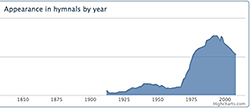 |
| 10 |
Or
'who camest from England', as this hymn is virtually
unsung outside the former British empire.
'O thou who camest from above'
|
Hereford, Samuel
Sebastian Wesley, 1872. Apparently there are other tunes
contesting for dominance, but we've never heard anything
other than Hereford. The purple 'Other' is especially
intriguing.
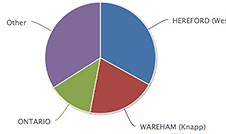
|
Charles
Wesley wrote this stirring hymn in 1762. |
A
superb pairing by grandfather and grandson and a hymn better
known in England than elsewhere.
The phrase 'inextinguishable blaze' is inexplicably changed to
'ever bright undying blaze' in the Episcopal Church Hymnal
1982. |
| 11 |
Holding
at No. 11. Perhaps it's shaken off those negative football
associations at last. HF
Lyte would be pleased.
'Abide with me, fast falls the eventide' |
Eventide, WH
Monk, 1861. According to some sources, Monk wrote EVENTIDE
for Lyte's text in ten minutes. 'As the story goes, Monk
was attending a hymnal committee meeting for the 1861 edition
of Hymns Ancient and Modern of which he was music
editor. Realizing that this text had no tune, Monk sat down
at the piano and composed EVENTIDE'. |
 Henry
Francis Lyte wrote this not long before he died in 1847. Henry
Francis Lyte wrote this not long before he died in 1847. |
Lugubrious,
perhaps, but well loved — and indeed sung in other
places than football stadiums.
In fact, it was sung at the
wedding of King George VI and at the wedding
of his daughter, the future Queen Elizabeth II. |
|
2003
Edition
|
| |
Hymn |
Tune,
composer, year |
Author
or translator, year |
Comments |
| 1 |
 'I
bind unto myself today' 'I
bind unto myself today'
|
St
Patrick's Breastplate, Charles Villiers Stanford,
1902 |
Translated
in 1889 by the prolific and gifted Mrs C F Alexander,
from a very early Gaelic poem.
|
The
Gaelic poem was called St Patrick’s Lorica or
breast-plate. A lorica was a mystical garment that would
supposedly protect the wearer from danger. A favourite across
many countries. |
| 2 |
'Amazing
grace, how sweet the sound' |
New
Britain, from Southern Harmony 1835 |
John
Newton, 1779. |
 Top-rated
with American readers, it had no votes from elsewhere in
the Communion. Top-rated
with American readers, it had no votes from elsewhere in
the Communion. |
| 3 |
'Be
thou my vision' |
Slane, Irish
folk melody |
Translated
into English by Mary E. Byrne, in “Eriú,” Journal
of the School of Irish Learning, 1905, and put into rhyme
by Eleanor H. Hull, 1912. |
Another
ancient Irish favourite. For a while it looked as if it would
be Number One in our list. It slipped a bit but remains a
firm favourite across several countries. Hard to tell whether
its fans are keener about the words or the music. |
4 |
'Come
down, O Love Divine' |
 Down
Ampney, Ralph Vaughan Williams, 1906. (Down Ampney
vicarage, right) Down
Ampney, Ralph Vaughan Williams, 1906. (Down Ampney
vicarage, right) |
Mid-14th
century Spanish poem by Bianco da Siena; English translation
by Richard Littledale in 1867. |
The
first appearance of a Ralph
Vaughan Williams tune, this hymn was a cross-Communion
favourite. |
| 5 |
'All
my hope on God is founded' |
Michael, Herbert
Howells, 1935 |
Based
on the German of Joachim Neander (1650-1680), Robert S. Bridges
adapted it in 1899. |
This
popular choice was linked to a fondness for Howells' brilliant
setting. We suspect that the hymn itself wouldn't appear
in the list if it was sung to Coblentz. |
| 6 |
'For
all the saints who from their labours rest' |
Sine
Nomine, Ralph Vaughan Williams, 1906 |
William
W. How, in Hymns for Saint’s Days, and Other Hymns, wrote
this in 1864. |
A
popular text married to a brilliant tune. One of the few
hymn texts written by an Anglican bishop, the much-loved
Bishop of Wakefield. |
| 7 |
'Let
all mortal flesh keep silence' |
Picardy, French
carol melody |
Translated
from Greek to English by Gerard Moultrie in 1864, from the
Liturgy of S. James, fourth century AD. |
 This
mystical text, combined with a haunting melody, was again
a choice from various countries across the Communion. This
mystical text, combined with a haunting melody, was again
a choice from various countries across the Communion. |
| 8 |
'Dear
Lord and Father of mankind' |
The
old Victorian standard — Rest (Maker), by Frederick
C. Maker, 1887 — is not what put this hymn into the
Top Ten, but rather the 1888 setting Repton, by CHH
Parry. It's also occasionally sung to Hammersmith (Gladstone), by,
er, WH Gladstone.
|
 John
Greenleaf Whittier published this in the Atlantic Monthly in
1872. It is an excerpt from a longer epic (see right). John
Greenleaf Whittier published this in the Atlantic Monthly in
1872. It is an excerpt from a longer epic (see right). |
An
example of a hymn chosen specifically with reference to a
particular setting; in this case, Repton. Until we
did a bit of research on the text, we had no idea it referenced
Vedic priests and cocaine-like concoctions called 'soma'.
The story is here. |
| 9 |
'Joyful,
joyful, we adore thee' |
 Hymn
to Joy, L. van Beethoven, from the Ninth Symphony, adapted
by Edward Hodges, 1824 Hymn
to Joy, L. van Beethoven, from the Ninth Symphony, adapted
by Edward Hodges, 1824 |
Henry
J. van Dyke wrote this hymn while a guest at Williams College,
Massachusetts, USA in 1907. |
Another
example of a regional favourite; it appears in US, Canada,
and Australian hymnals |
| 10 |
'O
thou who camest from above' |
Hereford, SS
Wesley, 1872. |
Charles
Wesley wrote this stirring hymn in 1762. |
A
superb pairing by grandfather and grandson. An example of
a hymn far better known in the Church of England than elsewhere.
The phrase 'inextinguishable blaze' in the second verse is
inexplicably changed to 'ever bright undying blaze' in the
Episcopal Church in the USA Hymnal 1982. |
| 11 |
'Abide
with me, fast falls the eventide' |
Eventide, WH
Monk, 1861. |
 Henry
Francis Lyte wrote this not long before he died in 1847. Henry
Francis Lyte wrote this not long before he died in 1847. |
Lugubrious,
perhaps, but well loved — and indeed sung in other
places than football stadiums. In fact, we learn from the
Cyberhymnal that it 'was sung at the wedding of King George
VI of Britain, and at the wedding of his daughter, the future
Queen Elizabeth II'. |
| 12 |
'All
creatures of our God and King' |
Lasst
Uns Erfreuen (Köln, Germany: 1623); harmony
by Ralph Vaughan Williams, 1906. |
Francis
of Assisi, circa 1225 (Cantico di fratre sole, Song
of Brother Sun). 'Translated into English by WH Draper for
a children’s Whitsuntide festival in Leeds, England;
first appeared in the Public School Hymn Book, 1919',
according to the Cyberhymnal. |
The
Reverend WH Draper penned about 60 hymns, but this is the
only one widely known and loved. The others are dated period
pieces, with such titles as 'We Love God’s Acre Round
the Church' and 'What Can I Do for England?'. The
tune Lasst Uns Erfreuen is also used for the lovely
text 'Ye watchers and ye holy ones'. |
| 13 |
'I
come with joy to meet my Lord' |
Set
to a frightening number of tunes, including St Botolph,
Land of Rest, University, Barchester Fair, Bramwell, and Twyford. |
Brian
Wren, 1971. |
An
American Episcopal favourite when sung to Land of Rest. The
only Top 20 hymn written after World War II. |
| 14 |
'I
sing a song of the saints of God' |
Grand
Isle, John Henry Hopkins Jr |
Lesbia
Scott, 1929. |
Whilst
charmingly old-fashioned, the text succeeds at not being
a period piece. There is a dreadful Americanization of
the lyrics; tea and shops are banished for stores and houses
next door. Mrs Scott apparently wrote hymns for her three
children; this is the only one we know that has been published. |
| 15 |
'Lift
high the cross' |
Crucifer, Sydney
H. Nicholson, 1916 |
George
William Kitchin; modified by Michael Robert Newbolt, 1916. |
One
of those hymns which seems to be either loved or hated. George
William Kitchin, author of the text, was successively Dean
of Winchester, Dean of Durham, and then first Chancellor
of the University of Durham. |
| 16 |
'Lord
of all hopefulness' |
Slane, Irish
folk melody |
Jan
Struther (pseudonym of Joyce Anstruther Graham Plaszek),
1931. |
 Is
it the words or the melody that catapults 'Lord of All
Hopefulness' into the Top 20? Slane is already
in the number-three place with another text. Non-sequitur:
We came across this intriguing advice: 'This hymn is
suitable as the third hymn sung after the signing of
the register'. Is
it the words or the melody that catapults 'Lord of All
Hopefulness' into the Top 20? Slane is already
in the number-three place with another text. Non-sequitur:
We came across this intriguing advice: 'This hymn is
suitable as the third hymn sung after the signing of
the register'.
|
17 |
'Love
divine, all loves excelling' |
Sometimes
sung to Beecher, Airedale, Blaenwern, and Love
Divine (Stainer), we confess we never want it sung to
anything other than Hyfrydol, by Rowland Huy Pritchard,
1830. |
 Charles
Wesley, 1747. Charles
Wesley, 1747. |
Another
Wesley super hit. Is there any Anglican who doesn't like
this hymn? |
| 18 |
'My
song is love unknown' |
Love
Unknown, John Ireland, 1919. |
Samuel
Crossman, from The Young Man’s Meditation, or Some
Few Sacred Poems upon Select Subjects, and Scriptures, 1664. |
After
a chequered vocation, careering between Anglican and Puritan
and back, Crossman eventually made his peace with the Church
of England. He later became Dean of Bristol, in which cathedral
he is buried. The text is much loved, with a simple and direct
pathos that never descends to the mawkish. |
| 19 |
'The
king of love my shepherd is'
 |
Sung
to either St Columba, one of those ancient Irish melodies,
or Dominus Regit Me, John Bacchus Dykes, 1868. |
HW
Baker, circa 1865. |
A
much-loved text by the Reverend Sir Henry Williams Baker,
who was editor of Hymns Ancient and Modern from 1860-77.
He died on 12 February 1877, at Monkland, Herefordshire,
England. His friend John Ellerton reported that Baker’s
dying words were from his famous hymn:
Perverse and foolish oft I strayed,
But yet in love He sought me,
And on His shoulder gently laid,
And home, rejoicing, brought me. |
| 20 |
'When
I survey the wondrous cross' |
Set
to Rockingham, arranged by Edward Miller, 1790 or
less commonly, Hamburg, Lowell Mason, 1824. And there
is always Eucharist, Isaac B. Woodbury, 1819. |
Isaac
Watts, Hymns and Spiritual Songs, 1707. Charles Wesley
(above) is alleged to have said he would give up all his
other hymns to have written this one. |
The
only representative of the oeuvre of the prolific Isaac Watts,
but perhaps his most brilliant and effective text. |
| |
| Here
are a few of the other hymns that got a scattering of
votes here and there, in no particular order. |
| 'Immortal,
invisible, God only wise' |
'Lo!
He comes with clouds descending' |
'Ye
watchers and ye holy ones' |
'Alleluia,
sing to Jesus' |
| 'Crown
him with many crowns' |
'Father,
hear the prayer we offer' |
'New
every morning is the love' |
'Praise
to the holiest in the height' |
| 'Wake,
awake for night is flying' (Wachet Auf) |
'Ye
holy angels bright, who wait at God's right hand' |
'Of
the Father’s heart begotten' |
'All
praise to thee, for thou, O King divine' |
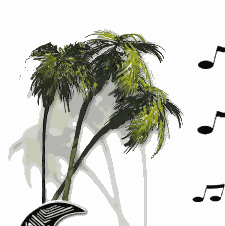 Desert
Island Hymns
Desert
Island Hymns

 Translated
into English by Mary E. Byrne, in “Eriú,” Journal
of the School of Irish Learning, 1905, and put into
rhyme by Eleanor H. Hull, 1912.
Translated
into English by Mary E. Byrne, in “Eriú,” Journal
of the School of Irish Learning, 1905, and put into
rhyme by Eleanor H. Hull, 1912.  Translated
in 1889 by the prolific and gifted Mrs C F Alexander, from
a very early Gaelic poem.
Translated
in 1889 by the prolific and gifted Mrs C F Alexander, from
a very early Gaelic poem. Just
in case you ever thought about a St Patrick's breastplate
t-shirt, you can now purchase one.
Just
in case you ever thought about a St Patrick's breastplate
t-shirt, you can now purchase one. 
 Another
Wesley super hit. Is there any Anglican who doesn't like
this hymn?
Another
Wesley super hit. Is there any Anglican who doesn't like
this hymn?  Down
Ampney, Ralph Vaughan Williams, 1906. (Down Ampney
vicarage, right, where RVW was born.)
Down
Ampney, Ralph Vaughan Williams, 1906. (Down Ampney
vicarage, right, where RVW was born.)
 The
blessed George Herbert, with the text in his work 'The Temple'.
The
blessed George Herbert, with the text in his work 'The Temple'. 
 Love
Unknown, John Ireland, 1919.
Love
Unknown, John Ireland, 1919. John
Ellerton (1826-1893) wrote this text as a part of 'A Liturgy
for Missionary Meetings' in 1870. One might well call that
year a high point of the British Empire.
John
Ellerton (1826-1893) wrote this text as a part of 'A Liturgy
for Missionary Meetings' in 1870. One might well call that
year a high point of the British Empire.  We
don't know why the pink is red in this case. But the point
is still the same.
We
don't know why the pink is red in this case. But the point
is still the same.
 <-
John Bunyan lived here.
<-
John Bunyan lived here. Henry
J. van Dyke wrote this hymn while a guest at Williams College,
Massachusetts, USA in 1907. We don't know what inspired him.
Henry
J. van Dyke wrote this hymn while a guest at Williams College,
Massachusetts, USA in 1907. We don't know what inspired him. 

 Henry
Francis Lyte wrote this not long before he died in 1847.
Henry
Francis Lyte wrote this not long before he died in 1847. 'I
bind unto myself today'
'I
bind unto myself today' Top-rated
with American readers, it had no votes from elsewhere in
the Communion.
Top-rated
with American readers, it had no votes from elsewhere in
the Communion. Down
Ampney, Ralph Vaughan Williams, 1906. (Down Ampney
vicarage, right)
Down
Ampney, Ralph Vaughan Williams, 1906. (Down Ampney
vicarage, right) 
 John
Greenleaf Whittier published this in the Atlantic Monthly in
1872. It is an excerpt from a longer epic (see right).
John
Greenleaf Whittier published this in the Atlantic Monthly in
1872. It is an excerpt from a longer epic (see right). Hymn
to Joy, L. van Beethoven, from the Ninth Symphony, adapted
by Edward Hodges, 1824
Hymn
to Joy, L. van Beethoven, from the Ninth Symphony, adapted
by Edward Hodges, 1824
 Is
it the words or the melody that catapults 'Lord of All
Hopefulness' into the Top 20? Slane is already
in the number-three place with another text. Non-sequitur:
We came across this intriguing advice: 'This hymn is
suitable as the third hymn sung after the signing of
the register'.
Is
it the words or the melody that catapults 'Lord of All
Hopefulness' into the Top 20? Slane is already
in the number-three place with another text. Non-sequitur:
We came across this intriguing advice: 'This hymn is
suitable as the third hymn sung after the signing of
the register'. Charles
Wesley, 1747.
Charles
Wesley, 1747.